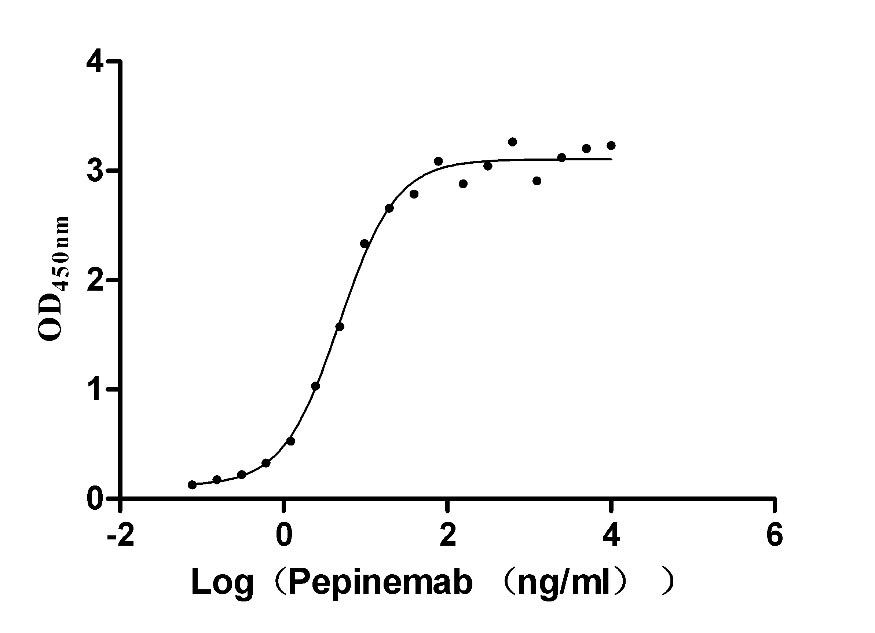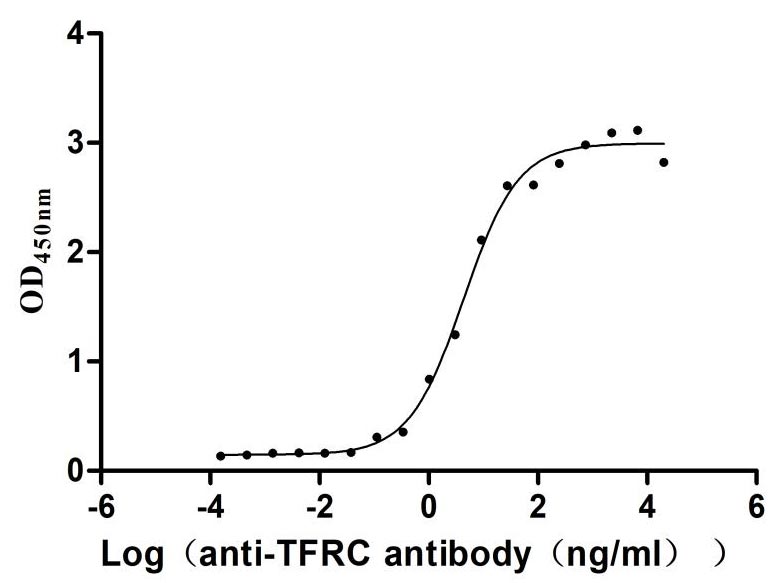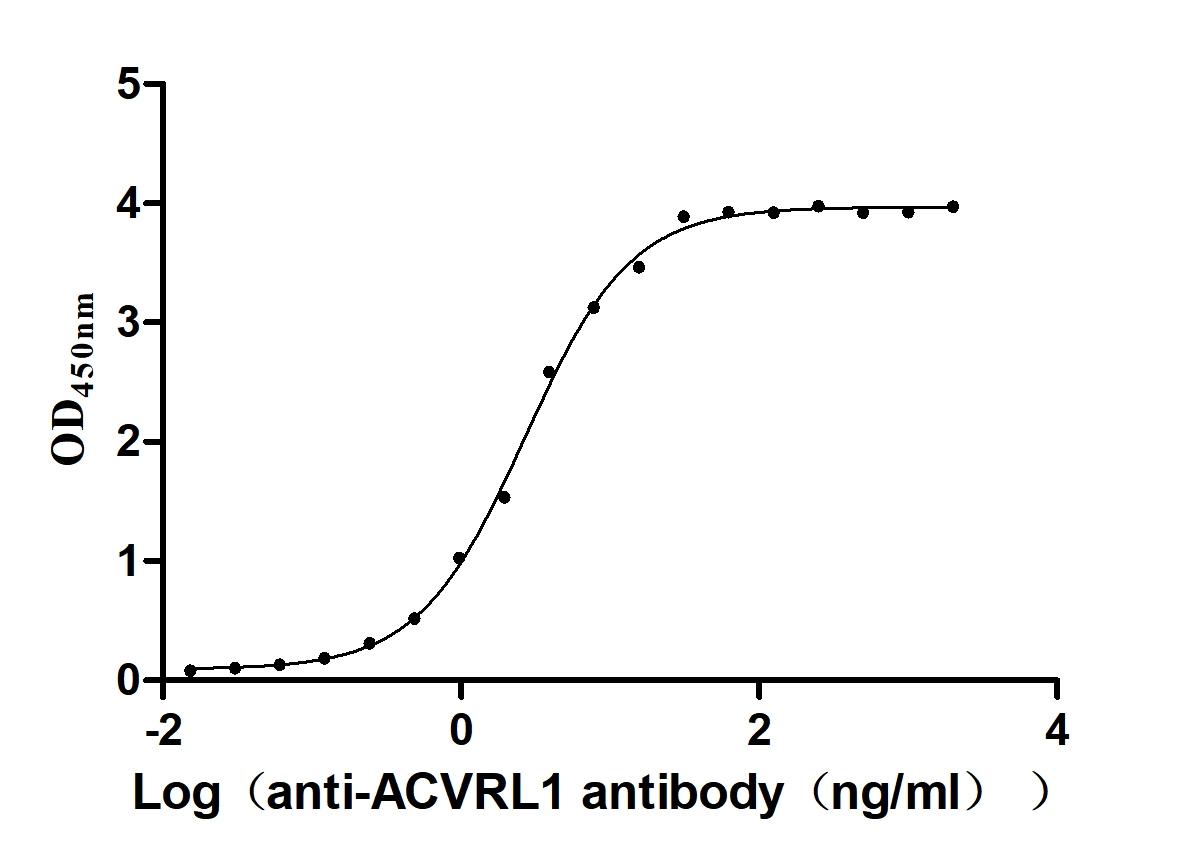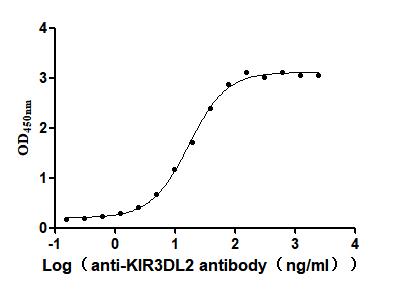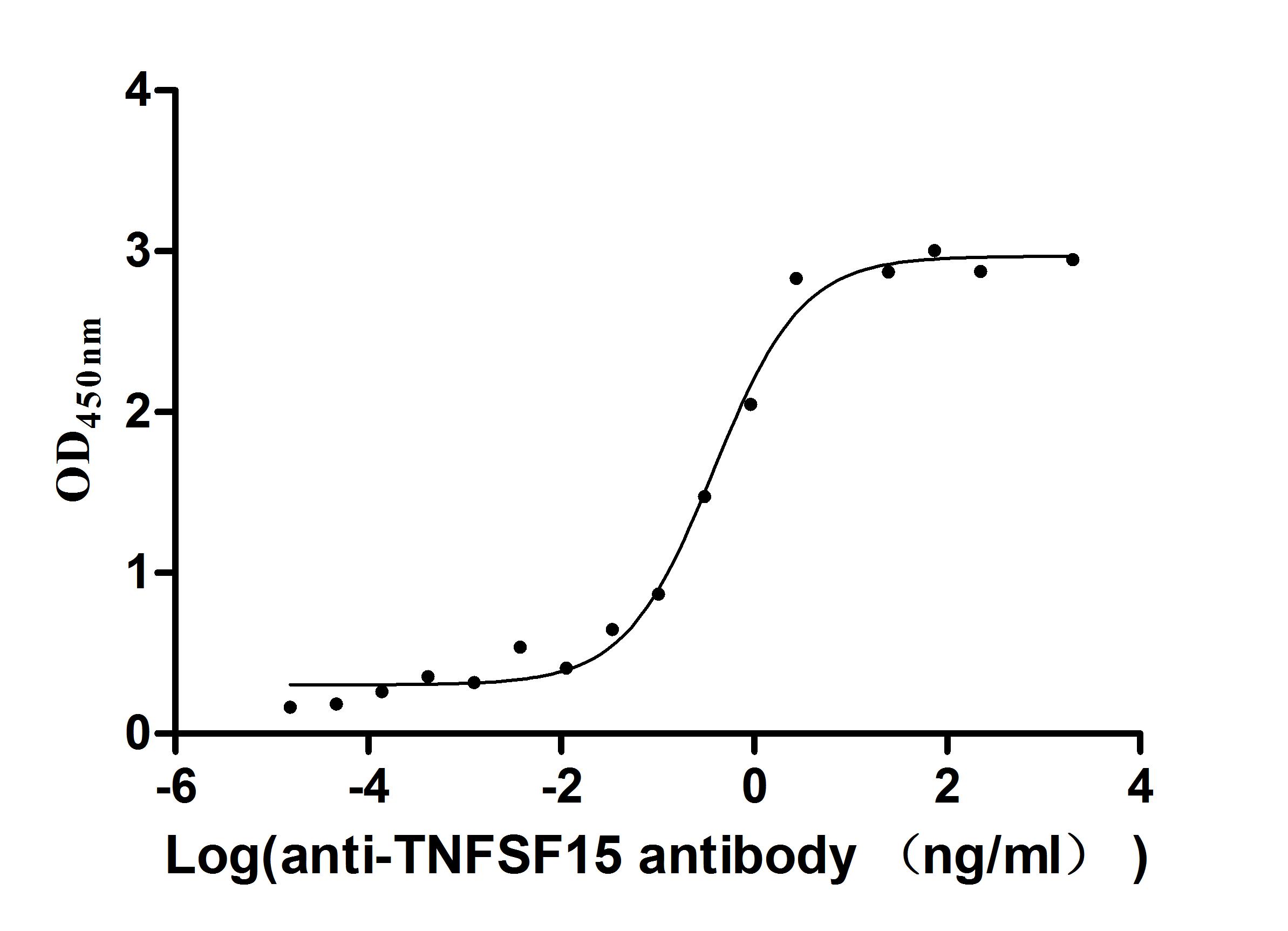Recombinant Mouse Tribbles homolog 3 (Trib3)
-
货号:CSB-YP818358MO
-
规格:
-
来源:Yeast
-
其他:
-
货号:CSB-EP818358MO-B
-
规格:
-
来源:E.coli
-
共轭:Avi-tag Biotinylated
E. coli biotin ligase (BirA) is highly specific in covalently attaching biotin to the 15 amino acid AviTag peptide. This recombinant protein was biotinylated in vivo by AviTag-BirA technology, which method is BriA catalyzes amide linkage between the biotin and the specific lysine of the AviTag.
-
其他:
-
货号:CSB-BP818358MO
-
规格:
-
来源:Baculovirus
-
其他:
-
货号:CSB-MP818358MO
-
规格:
-
来源:Mammalian cell
-
其他:
产品详情
-
纯度:>85% (SDS-PAGE)
-
基因名:
-
Uniprot No.:
-
别名:Trib3; Nipk; Trb3; Tribbles homolog 3; TRB-3; Neuronal cell death-inducible putative kinase
-
种属:Mus musculus (Mouse)
-
蛋白长度:full length protein
-
表达区域:1-354
-
氨基酸序列MRATPLAASA DVSCRKKPLE FDDNIDAKCP VLKRVRDEPE PGPLPSLLPP SPPPASDLSP AVAPATRLGP YILLEREQGS CSYRALHCPT GTEYTCKVYP ASEAQAVLAP YARLPTHQHV ARPTEVLLGS RLLYIFFTKT HGDLHSLVRS RRGIPESEAA GLFRQMASAV AHCHKHGLVL RDLKLRRFVF SNCERTKLVL ENLEDACVMT GSDDSLWDKH ACPAYVGPEI LSSRPSYSGK AADVWSLGVA LFTMLAGRYP FHDSEPVLLF GKIRRGTFAL PEGLSAPARC LIRCLLRKEP SERLVALGIL LHPWLREDHG RVSPPQSDRR EMDQVVPDGP QLEEAEEGEV GLYG
-
蛋白标签:Tag type will be determined during the manufacturing process.
The tag type will be determined during production process. If you have specified tag type, please tell us and we will develop the specified tag preferentially. -
产品提供形式:Lyophilized powder
Note: We will preferentially ship the format that we have in stock, however, if you have any special requirement for the format, please remark your requirement when placing the order, we will prepare according to your demand. -
复溶:We recommend that this vial be briefly centrifuged prior to opening to bring the contents to the bottom. Please reconstitute protein in deionized sterile water to a concentration of 0.1-1.0 mg/mL.We recommend to add 5-50% of glycerol (final concentration) and aliquot for long-term storage at -20℃/-80℃. Our default final concentration of glycerol is 50%. Customers could use it as reference.
-
储存条件:Store at -20°C/-80°C upon receipt, aliquoting is necessary for mutiple use. Avoid repeated freeze-thaw cycles.
-
保质期:The shelf life is related to many factors, storage state, buffer ingredients, storage temperature and the stability of the protein itself.
Generally, the shelf life of liquid form is 6 months at -20°C/-80°C. The shelf life of lyophilized form is 12 months at -20°C/-80°C. -
货期:Delivery time may differ from different purchasing way or location, please kindly consult your local distributors for specific delivery time.Note: All of our proteins are default shipped with normal blue ice packs, if you request to ship with dry ice, please communicate with us in advance and extra fees will be charged.
-
注意事项:Repeated freezing and thawing is not recommended. Store working aliquots at 4°C for up to one week.
-
Datasheet :Please contact us to get it.
相关产品
靶点详情
-
功能:Inactive protein kinase which acts as a regulator of the integrated stress response (ISR), a process for adaptation to various stress. Inhibits the transcriptional activity of DDIT3/CHOP and is involved in DDIT3/CHOP-dependent cell death during ER stress. May play a role in programmed neuronal cell death but does not appear to affect non-neuronal cells. Acts as a negative feedback regulator of the ATF4-dependent transcription during the ISR: while TRIB3 expression is promoted by ATF4, TRIB3 protein interacts with ATF4 and inhibits ATF4 transcription activity. Disrupts insulin signaling by binding directly to Akt kinases and blocking their activation. May bind directly to and mask the 'Thr-308' phosphorylation site in AKT1. Interacts with the NF-kappa-B transactivator p65 RELA and inhibits its phosphorylation and thus its transcriptional activation activity. Interacts with MAPK kinases and regulates activation of MAP kinases. Can inhibit APOBEC3A editing of nuclear DNA.
-
基因功能参考文献:
- Using SNRK transgenic and KO mouse models, study found that SNRK decreases cardiac metabolic substrate usage and mitochondrial coupling, while protecting against ischaemia/reperfusion injury. Effects on substrate usage and cell death are dependent on UCP3, which is downregulated through suppression of PPARalpha by Trib3, a novel binding partner of SNRK. PMID: 28117339
- Overexpressed Trib3, specifically in skeletal muscle tissues, displayed impaired glucose homeostasis by suppressing insulin-stimulated glucose uptake. PMID: 30071535
- under nutrient-limiting conditions that stimulate ATF4 activity, TRIB3 is implicated in the regulation of metabolic adaptation by restraining the transcription of Fgf21. PMID: 29378327
- Data (including data from studies in transgenic and mutant mice) suggest that Akt2 plays critical role in type 1 diabetes in metallothionein-mediated preservation of cardiac insulin-stimulated metabolic signaling (insulin resistance) and preservation of cardiac function; this mechanism appear to involve inhibition of cardiac Trb3. (Akt2 = protein kinase Akt-2; Trb3 = tribbles pseudokinase 3) PMID: 29079702
- restoration of TRB3 expression markedly abolished the effect of miR-124 on hepatic TG metabolism. PMID: 27845424
- TRIB3, a single-domain protein with impaired kinase catalytic activity, has been described to perform a complex of roles, many of which are likely to be cell type-specific. (Review) PMID: 28393700
- TRB3 regulates protein synthesis and breakdown via the Akt/mTOR/FoxO pathways in skeletal muscle. PMID: 28962861
- Under physiological conditions, muscle TRIB3 also influences energy expenditure and substrate metabolism, indicating that the decrease and increase in muscle TRIB3 under fasting and nutrient excess, respectively, are critical for metabolic homeostasis. PMID: 27207527
- In a knockout mouse model, Trib3 disruption modestly increased steady-state erythrocyte numbers and decreased mean corpuscular volume. PMID: 28062363
- These data demonstrate that TRB3 inhibits insulin signaling in BAT, resulting in impaired differentiation and function. PMID: 26801556
- TRB3 is a novel profibrotic mediator in SSc. TGF-beta induces TRB3, which in turn activates canonical TGF-beta/Smad signaling and stimulates the release of collagen, creating a positive feedback loop that may contribute to aberrant TGF-beta signalling in SSc. PMID: 25603829
- study presents the finding that activation of the NF-kappaB pathway by Porphyromonas endodontalis LPS is important for Wnt5a expression in osteoblasts, and that TRIB3 may modulate the sustained expression of Wnt5a in osteoblasts stimulated by P. endodontalis PMID: 25601649
- Trib3 interferes with the Parkinson's disease-associated prosurvival protein Parkin to mediate death PMID: 26224857
- These observations support the notion that loss of TRIB3 is associated with a more aggressive phenotype in various types of tumors by enhancing the activity of the mTORC2/AKT/FOXO axis. PMID: 25168244
- Tribbles 3 regulates the fibrosis cytokine TGF- beta 1 through ERK1/2-MAPK signaling pathway in diabetic nephropathy. PMID: 25133193
- Fibroblasts from two long-lived mice mutants (Snell dwarf and PAPP-A knockout) expressed higher levels of TRB3 (a ATF4 target gene) during stress, suggesting a connection to longevity. PMID: 24691093
- TRB3(-/-) islets show a decrease in both the amplitude and duration of cytokine-stimulated MLK3 induction and JNK activation. PMID: 25204656
- Trib3 is upregulated in the mouse anterior piriform cortex in response to leucine-deficient diet. Deletion of Trib3 does not influence the rejection of amino acid-imbalanced diet. Trib3 is dispensable for spatial and reversal learning. PMID: 24732777
- These findings suggest that TRB3 was involved in lipoapoptosis of INS-1 beta cell PMID: 24824999
- show in renal tubular cells that TRB3 binds to mTOR and the rapamycin-insensitive companion of mTOR (Rictor), a protein specific to mTORC2 PMID: 24676635
- TRB3 regulates muscle fiber type via a peroxisome proliferator-activated receptor-alpha (PPAR-alpha)-regulated miR499/miR208b pathway, revealing a novel function for TRB3 in the regulation of skeletal muscle fiber type and exercise capacity. PMID: 24740654
- Data indicate that responding to Toll-like receptor 2 (TLR2)-specific stimulation, the expressions of cell death inducible putative kinase (NIPK) was significantly elevated. PMID: 25108431
- TRIB3 mediated ER stress-induced beta-cell apoptosis via the NF-kappaB pathway. PMID: 24746137
- observations presented here strongly support that TRIB3 plays a crucial role on THC anti-neoplastic activity PMID: 23567453
- Trib3 mRNA expression in bone-marrow-derived mast cells is upregulated by IL-3. Degranulation & activation-induced cytokine mRNA expression are impaired in Trib3-deficient BMMCs. PMID: 23261831
- TRB3 increased in diabetic testis and further increased in the testis of diabetic mice with Zn deficiency. PMID: 22000581
- Silence of TRIB3 would diminish atherosclerotic burden and increase the plaque stability in diabetic mice. PMID: 22275087
- emodin induces BV-2 cell apoptosis through TRB3 and consequently eliminates inflammatory microglia. PMID: 21275776
- HHcy impairs hepatic glycogen synthesis by inducing the expression of TRB3 PMID: 21435438
- the GCN2/eIF2alpha/ATF4 pathway is essential for the induction of the TRB3 gene transcription PMID: 21203563
- enhanced reactive oxygen species and/or free fatty acids associated with the diabetic milieu induce podocyte C/EBP homologous protein and TRB3 expression PMID: 20660016
- The pseudokinase tribbles homolog 3 interacts with ATF4 to negatively regulate insulin exocytosis in human and mouse beta cells. PMID: 20592469
- MLK3 mediates its effects via the pseudokinase TRB3, a mammalian homolog of Drosophila Tribbles. PMID: 20421299
- These data identify TRIB3 induction as a novel molecular mechanism in human insulin resistance and diabetes. PMID: 19996382
- acute exercise reverses TRB3 expression and insulin signalling restoration in muscle PMID: 19681769
- Knockdown of hepatic TRB-3 expression improved glucose tolerance, whereas hepatic overexpression of TRB-3 reversed the insulin-sensitive phenotype of PGC-1-deficient mice. PMID: 15107844
- The combination of elevated TRB3 and constitutive hepatic p70 S6 kinase activity results in decreased insulin signaling via the insulin receptor substrate-1 protein/phosphatidylinositol 3-kinase/Akt pathway. PMID: 16887816
- Results indicated that TRB3 plays a critical role in muscle differentiation. PMID: 17207467
- Deletion of Trib3 has minimal effect on insulin-induced Akt activation in hepatic tissue. PMID: 17303803
- Data show that TRB3 is an important negative regulator of adipogenesis that acts at an early step in the differentiation cascade to block the C/EBPbeta proadipogenic function. PMID: 17646392
- TRB3 acts as a potent negative regulator of PPARgamma, a master regulator of adipocyte differentiation, and tightly controls adipogenesis PMID: 18187772
- Data show that C/EBPbeta expression induced by insulin preceded that of TRB3 and that mutation of the C/EBPbeta binding site in TRB3 promoter abolished the responsiveness of the TRB3 gene to insulin. PMID: 19164449
- TRB3 expression was reduced in the hepatic tissue from diet-induced obesity (Swiss) and leptin-deficient (ob/ob) mice, when compared with respective control groups at rest. PMID: 19492410
- PPARalpha ligands may reduce cellular number by augmenting TRB3 expression, which in turn induces cell cycle arrest by reducing the expression of Cyclin B1. PMID: 19748123
显示更多
收起更多
-
亚细胞定位:Nucleus.
-
蛋白家族:Protein kinase superfamily, CAMK Ser/Thr protein kinase family, Tribbles subfamily
-
组织特异性:Highly expressed in liver. Not detected in heart, brain, spleen, lung, skeletal muscle, kidney or testis.
-
数据库链接:
KEGG: mmu:228775
STRING: 10090.ENSMUSP00000041747
UniGene: Mm.276018
Most popular with customers
-
Recombinant Human Semaphorin-4D (SEMA4D), partial (Active)
Express system: Mammalian cell
Species: Homo sapiens (Human)
-
Recombinant Human Transferrin receptor protein 1 (TFRC), partial (Active)
Express system: Mammalian cell
Species: Homo sapiens (Human)
-
Recombinant Human Serine/threonine-protein kinase receptor R3 (ACVRL1), partial (Active)
Express system: Baculovirus
Species: Homo sapiens (Human)
-
Recombinant Human Killer cell immunoglobulin-like receptor 3DL2 (KIR3DL2), partial (Active)
Express system: Mammalian cell
Species: Homo sapiens (Human)
-
Recombinant Human Myosin regulatory light chain 12A (MYL12A) (Active)
Express system: E.coli
Species: Homo sapiens (Human)
-
Express system: Mammalian cell
Species: Homo sapiens (Human)


